Key takeaways:
- Engaging with your audience through social media and personal interactions can significantly enhance anticipation and support for an album release.
- Timing and choosing the right promotional channels are crucial for increasing visibility and reaching the target audience effectively.
- A well-structured release timeline, including phases for preparation, launch, and post-release engagement, helps manage promotions and avoid chaos.
- Evaluating success through metrics and fan feedback enables continuous improvement and refines future release strategies.
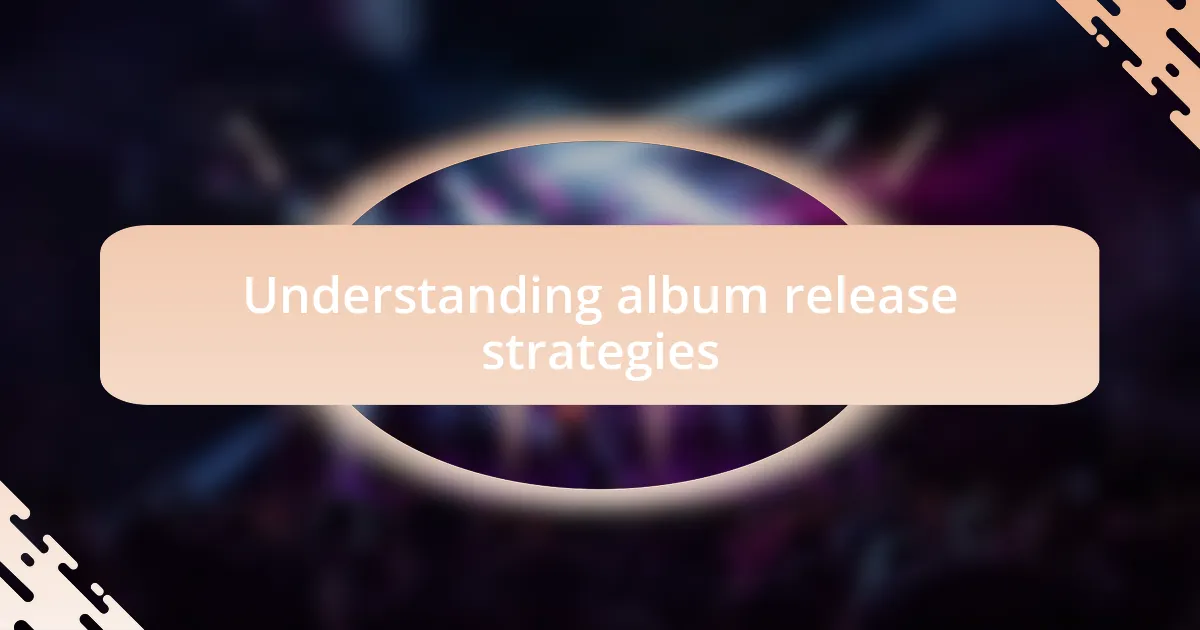
Understanding album release strategies
When it comes to album release strategies, understanding your audience is crucial. I remember launching my first album and realizing that my fans were eager for behind-the-scenes content. I used social media to share snippets of the creative process, creating excitement before the official release. Have you ever thought about how personal engagement can heighten anticipation?
Another aspect worth considering is timing. I once released an album meticulously planned for autumn, thinking it was the perfect season, but I learned that the market was saturated with major releases then. Who could have predicted that spring, with its fresh beginnings, might have been a better choice to stand out? Timing can dramatically influence visibility and engagement, so always analyze trends before committing.
I’ve also found that coordination with other promotional activities can amplify the impact of your release strategy. For instance, organizing a live performance around the album launch created a tangible connection with my audience. Have you tried this approach? Live events can transform an album release from a mere announcement into a memorable experience that fans talk about long after the music fades.
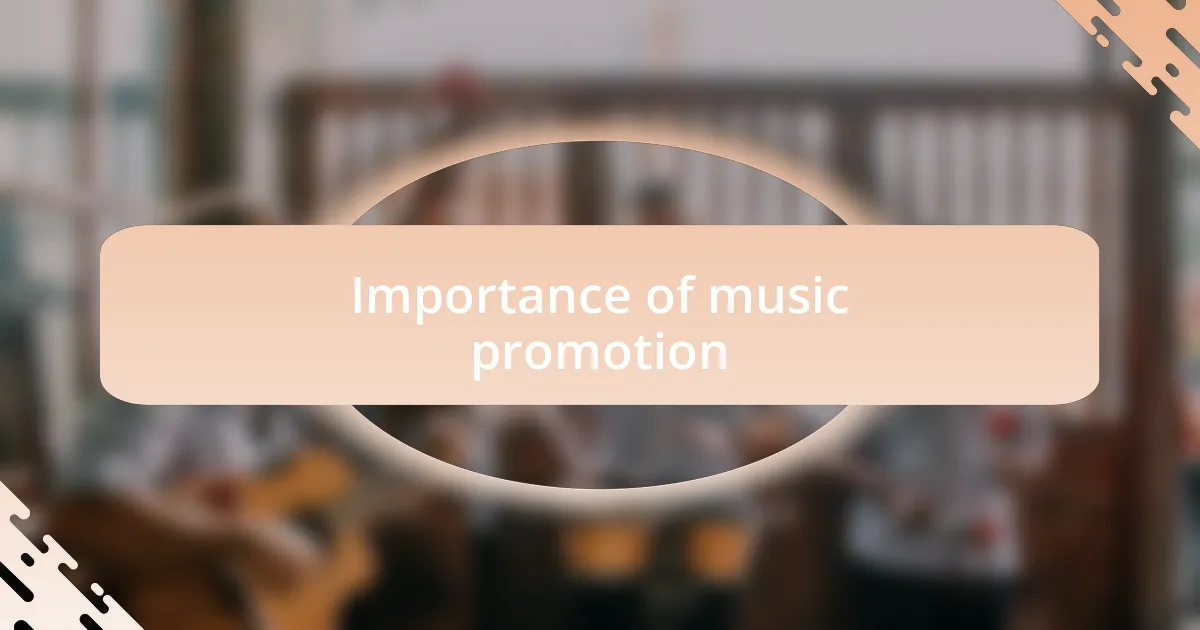
Importance of music promotion
The importance of music promotion cannot be overstated, as it serves as the bridge connecting an artist’s work to their target audience. I still recall the palpable sense of anxiety leading up to my second album release when I realized that simply having great music wasn’t enough. Without a solid promotion strategy, even the most heartfelt tracks can fade into obscurity. How many incredible songs have gone unheard simply because they lacked the spotlight?
Engaging fans through various channels is another aspect I’ve learned over time. During one of my promotional campaigns, I decided to host a Q&A session on social media. I was surprised by how much genuine interest there was! My connection with fans deepened as they felt valued and engaged, and it made me wonder: what if every artist took the time to interact with their audience more personally? It’s that kind of connection that can turn casual listeners into lifelong supporters.
Moreover, I’ve found that the right promotion can amplify critical reception. When I released a single alongside a well-timed press campaign, the buzz it generated led to several reviews that ultimately enhanced my visibility. I often ask myself, how can I better harness the power of music promotion to maximize the reach of my projects? It’s an ongoing exploration that continually shapes my approach to each new release.
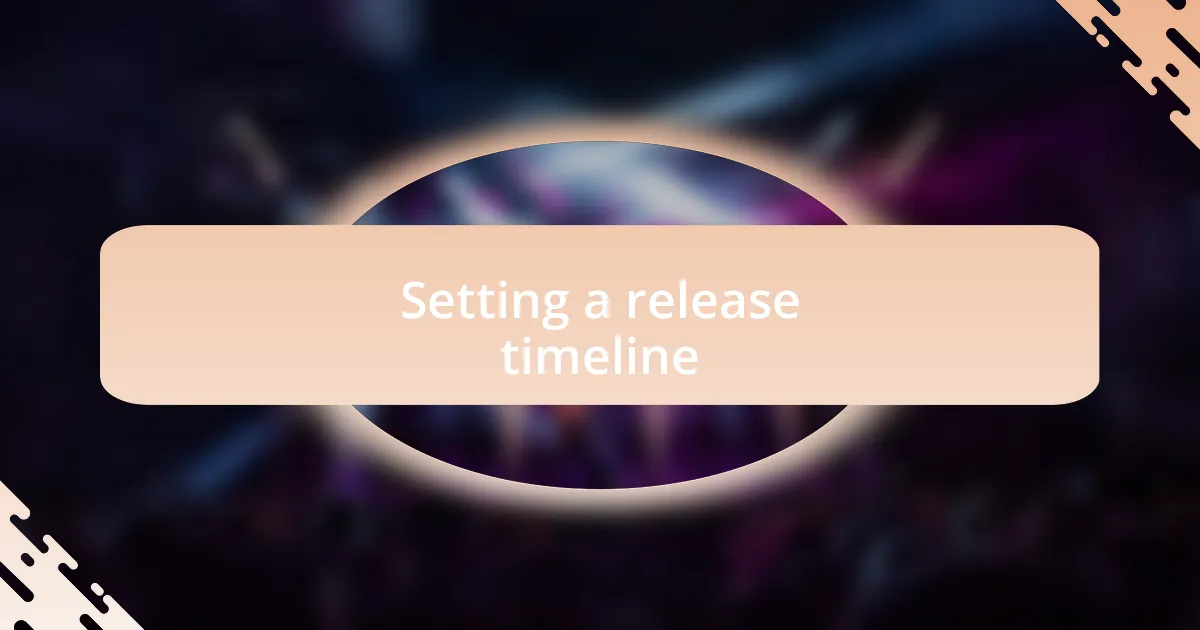
Setting a release timeline
When I plan an album release, I find it crucial to establish a well-structured timeline. Having a clear schedule helps me organize promotional activities, set deadlines for singles, and coordinate with other collaborators. I remember the chaos I experienced during my first release when I didn’t have a concrete timeline; it felt like I was scrambling to get everything right at the last minute.
As I refined my approach, I started breaking down the timeline into phases: preparation, launch, and post-release engagement. This method allows me to pace myself and avoid burnout. I often wonder, how can an artist ensure that each phase is given the attention it deserves? From my experience, dedicating specific time blocks for marketing strategy and fan engagement has made all the difference.
Additionally, I’ve learned to be flexible within the timeline. Life happens, and sometimes unexpected opportunities arise—like a chance to perform at a festival right before a release. I strive to adapt my plans without sacrificing the overall strategy. This flexibility has not only enhanced my album promotions but also provided me with memorable experiences that I wouldn’t want to miss.

Choosing the right promotional channels
Choosing the right promotional channels can truly make or break an album release. In my experience, it’s essential to match your channels with your target audience. For instance, when I released my last album, I focused heavily on social media platforms like Instagram and TikTok, knowing they appeal more to younger listeners. I made a few eye-catching videos, and what surprised me was how quickly they resonated with fans.
I also learned that not every channel fits every genre. During my early days, I mistakenly poured resources into a local radio campaign that didn’t yield results because my music resonated better with online audiences. That realization taught me to research and analyze where my listeners spend their time. Have you taken the time to discover which channels align with your brand? Trust me, the effort can shift the outreach from a trickle to a stream.
Email newsletters have been a game-changer for me, especially during release weeks. I remember sending out exclusive sneak peeks to my subscribers and witnessing a surge in pre-save numbers. Crafting personalized messages made fans feel valued and connected, which is something I strive for in every release. It’s about building relationships, after all—are you really connecting with your audience through the channels you choose?
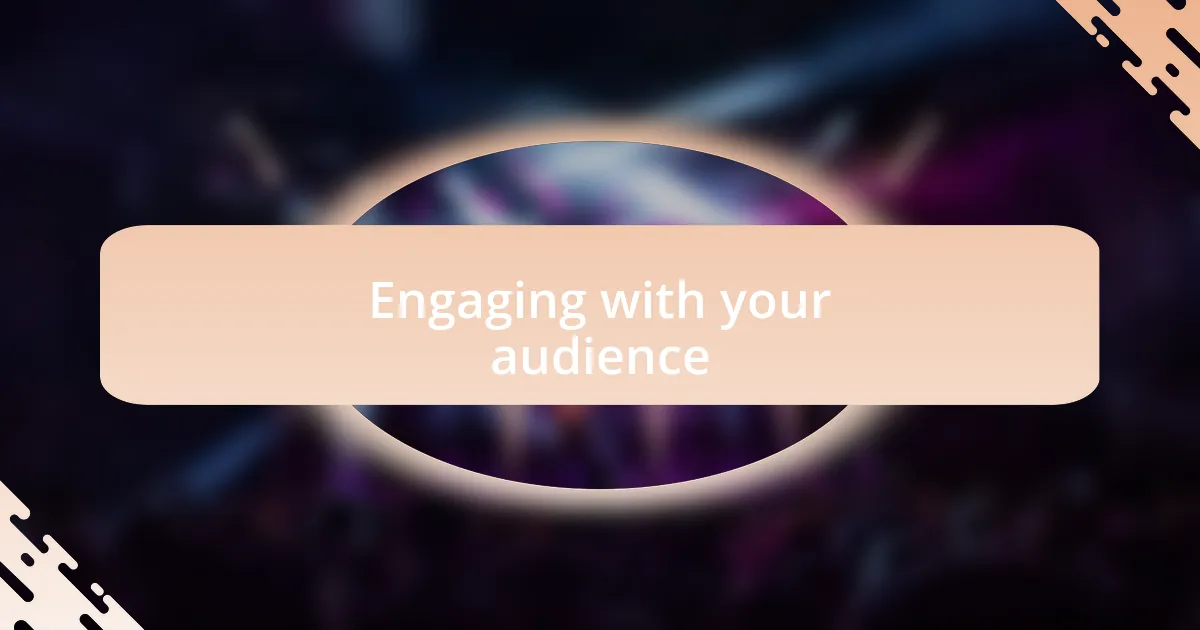
Engaging with your audience
Engaging with your audience isn’t just a side note; it’s the backbone of a successful album release. I’ve found that responding to comments and messages on social media can transform a casual fan into a loyal supporter. During my last album drop, I took the time to personally respond to as many fans as I could, and the warmth of those interactions created an incredible sense of community. Have you ever considered how just one genuine reply can spark someone’s enthusiasm for your music?
Live streaming has also been a powerful tool for me. When I hosted a virtual listening party for my latest album, the energy in the chat was palpable. I shared the stories behind each song and encouraged fans to ask questions in real time. Seeing their reactions and having them share their own experiences made me feel like we were all part of something special. How could you use a live platform to create that same connection and excitement?
Furthermore, bringing fans behind the scenes has always been particularly rewarding. I remember sharing the creative process on my blog, from songwriting to recording sessions. It felt intimate, like I was inviting listeners into my world. When fans connect with the journey, they invest in the outcome—don’t you think that collaboration in creativity enriches their experience and fosters a deeper bond?
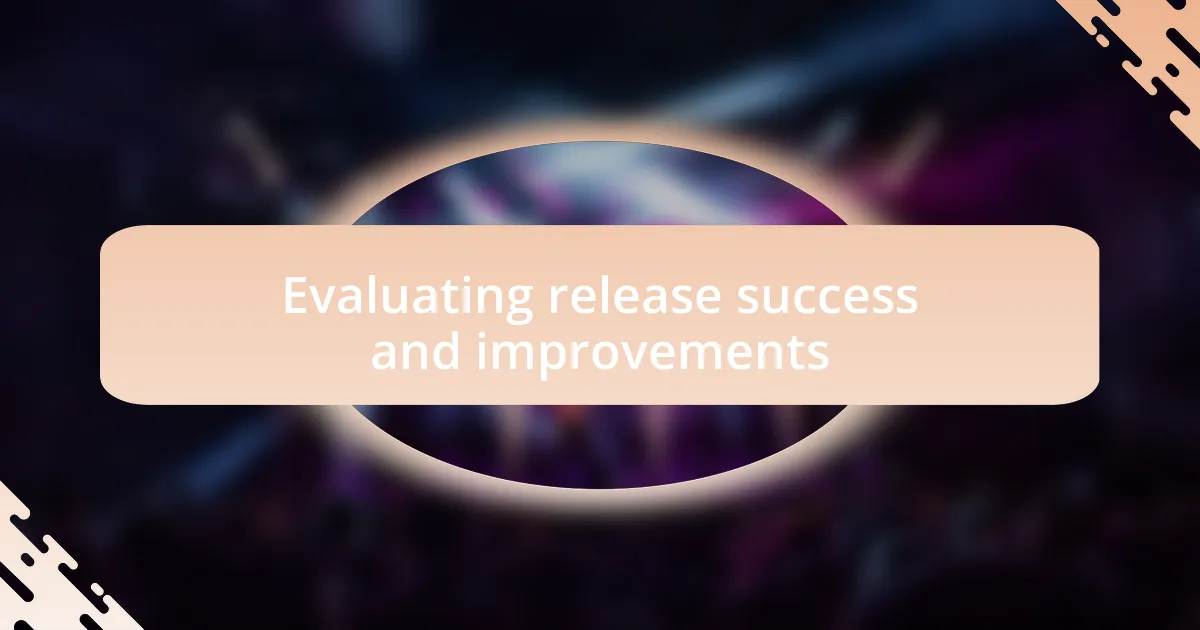
Evaluating release success and improvements
When it comes to evaluating the success of an album release, I often turn to metrics like streaming numbers and social media engagement. After my last release, I delved into the analytics, and it was fascinating to see which tracks resonated most with my listeners. Did you know that a spike in playlist placements can massively influence your reach? Understanding these patterns helps me refine my approach for future projects.
Another important aspect is gathering feedback directly from fans. I once created a survey post-release to gauge people’s reactions to my album. Not only did it provide me with fresh insights, but the feedback also highlighted areas for improvement, like the need for better promotion of specific songs. What if you took a similar approach and asked your audience to share their thoughts? Engaging them in this way can uncover valuable perspectives and foster a sense of involvement.
Finally, reflecting on my own experiences, I think about how I can enhance the entire release process. One lesson I’ve learned is to give myself ample time for planning and execution. During my earlier releases, I rushed some aspects, and it showed. Those early missteps taught me that continuous learning is essential. How do you plan to adapt based on your previous experiences? Embracing that mindset can transform your future releases into even bigger successes.